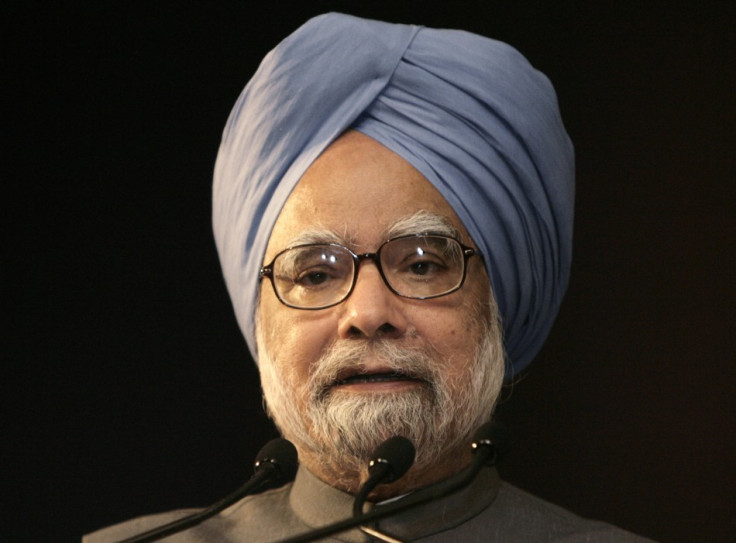India Crisis: Manmohan Singh Claims Sharp Rupee Decline a Necessary Adjustment

India's Prime Minister Manmohan Singh told parliament that the fundamentals of Asia's third largest economy remained strong even as the country battles high inflation, falling GDP growth, a huge trade gap, a depreciating rupee and political turmoil.
Singh also said the falling value of the rupee, which has suffered a painful decline in recent months, was a "needed adjustment" and that the depreciated currency would increase the country's export competitiveness, while discouraging imports, in turn boosting the battered economy.
Reading from a prepared statement, Singh told the lower house of India's parliament that he expects "relatively flat" growth in the first quarter. A Reuters poll of economists forecast a 4.7% GDP growth on an annual basis for the April to June quarter, which is slightly lower than the preceding quarter's 4.8% growth.
Growth, he said, would "pick up" as the effects of good monsoon rainfall kicks in. The annual monsoon accounts for 70% of India's rainfall and irrigates more than half its farmland.
Singh promised his government would act to reduce the "unsustainably large" current account deficit (CAD), the broadest measure of trade. India's current account deficit, at 4.9% of GDP, is the third highest in the world, according to a Morgan Stanley report. At $98bn (£63bn €74bn) it trails only the UK ($106bn) and the US ($473bn).
On the sharp rupee decline, Singh said global factors such as tensions over Syria and the prospect of the US Federal Reserve tapering its $85bn bond-buying stimulus had contributed to a general weakness in emerging market currencies.
However, domestic factors and India's large current account deficit were also responsible for the fall in the value of the rupee, he added. The currency has lost about 20% of its value since May.
"Clearly we need to reduce our appetite for gold, economise the use of petroleum products and take steps to increase our imports," Singh said.
"We have taken measures to reduce the current account deficit. The finance minister has indicated that it will be below $70bn this year, and we will take all possible steps to ensure that outcome," he added
Responding to Singh's parliament speech, opposition leader Arun Jaitley said that mere words would not suffice.
"You lost the trust of global investors, you lost the trust of domestic investors ... What is the priority of this government? If you continue to follow the course, then the legacy that you leave behind will not be the legacy that you left behind as the finance minister [in 1991]. That legacy was different," Jaitley told the upper house.
Earlier in the week, French bank BNP Paribas slashed its India GDP forecast for the ongoing financial year and said that the country's macro-economic situation was "fast approaching crisis proportions".
BNP Paribas cut India's GDP forecast to 3.7% for the 2014 financial year from 5.7%. If met, it would mark India's lowest growth rate in 22 years.
South Asia's longest serving prime minister, Singh, will lead his coalition government to the polls early next year. But weakening economic growth over the years and multiple graft scandals have dented his coalition's image.
India's economic growth hit a decade low of 5% in the 2013 financial year. Scandals rocked parliament where opposition parties have, on several occasions, refused to engage in debate about legislation that could have boosted growth.
Singh's skilful handling of the 1991 balance-of-payments crisis was the trigger for the economic growth that followed over the next two decades. Critics argue that the octogenarian economist has not done enough to rescue the economy in the ten years that his government occupied power.
© Copyright IBTimes 2024. All rights reserved.







